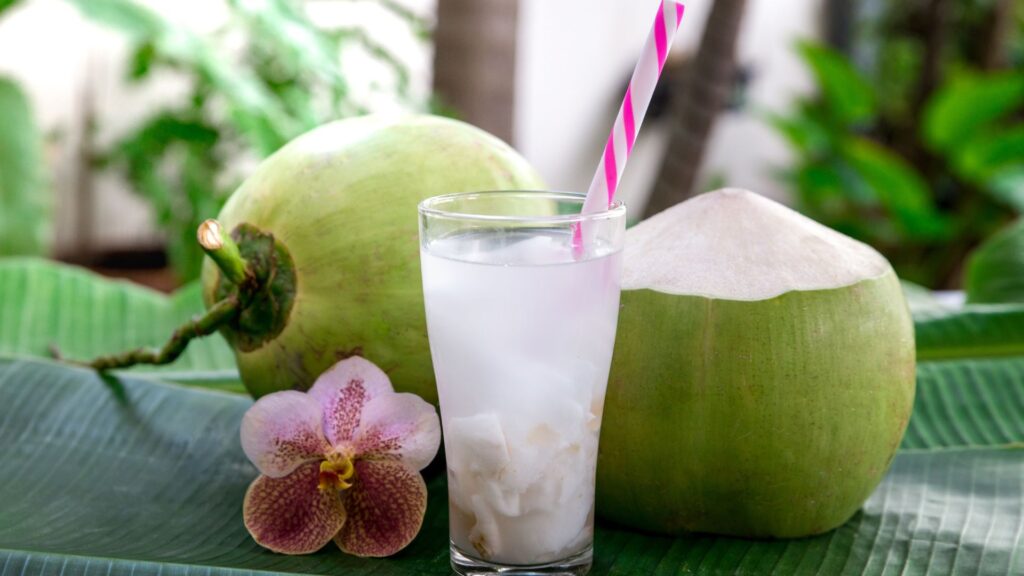
Goodness from the ‘Tree of Life’ – Part One
Hollywood celebrities are notorious for adopting either a new fashion trend or a living trend. In recent years, coconut water has become quite the trendy beverage among celebrities. In contemporary celebrity interviews, whoever the icon will likely be chugging coconut water. Previously, it was Russian vodka. After a few seasons, the drink of choice became glasses of herbal tea. Now, however, there is just ‘coconut water’.
The coconut (Coco nucifera) is the fruit and seed of a type of palm tree and coconut is a versatile fruit with a high monetary worth. They grow in the tropics, and its white meat, oil, and juices are all highly sought after.
Though mango is the king of fruits in India, coconut is revered as a symbol of fortune, a natural blessing, an auspicious object of ritual, a handy item of handicraft, and a necessary element in cuisine.
Regardless of whether a celebrity endorses it or not, coconut water is a reliable source of nutrients. Coconut water, in addition to being naturally sweet and hydrating, is high in several vital nutrients, including minerals that many people need.
You’ve come to the right place if you’re seeking nutritionist advice on coconut mesh, oil, milk, and water. Continue reading to learn what Sirwiss-partnered nutritionists have to say about the much-coveted coconut water.
Coconut
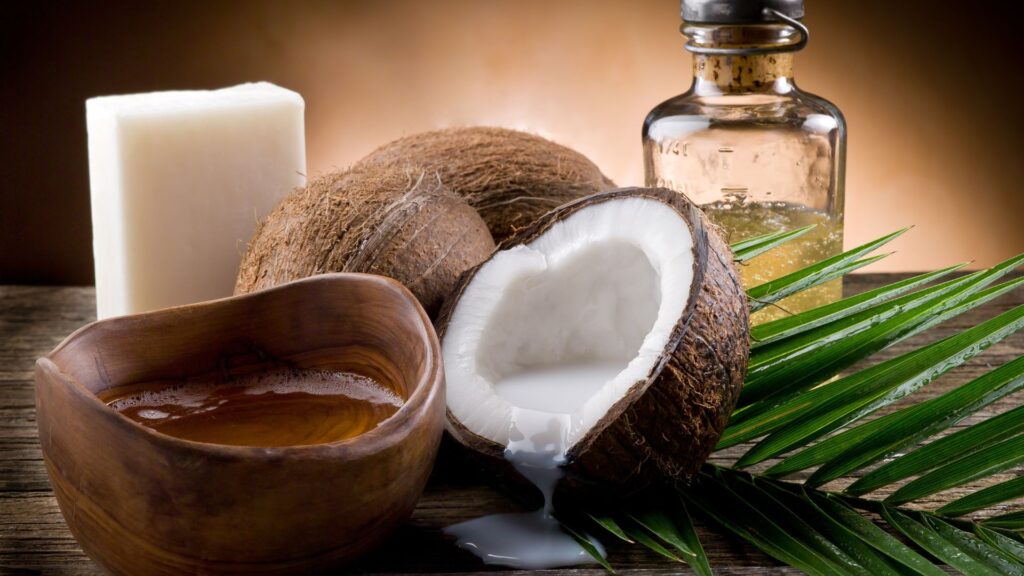
Coconuts, often referred to as the “Tree of Life,” provide us with an abundance of healthy products which have surprising purposes and benefits. Few foods symbolize tropical deliciousness more than coconut, but its application does not have to be limited to blended poolside beverages. This inconspicuous palm can sustain our bodies in any season with its delectable milk, heart-healthy oil, and electrolyte-boosting water.
This palm fruit has been traditionally used as a treatment for everything from abscesses to asthma, and modern science is now beginning to confirm its efficacy. The coconut has many health benefits that can be utilized year-round when it is broken down into all of its marvelous components.
Coconut Nutrition Facts
| Calories | 160 |
| Fat | 15g |
| Sodium | 9mg |
| Carbohydrates | 6.8g |
| Fiber | 4g |
| Sugars | 2.8g |
| Protein | 1.5g |
| Potassium | 160mg |
| Manganese | 0.68mg |
| Selenium | 4.5mcg |
Science-Based Health Benefits of Coconut Water
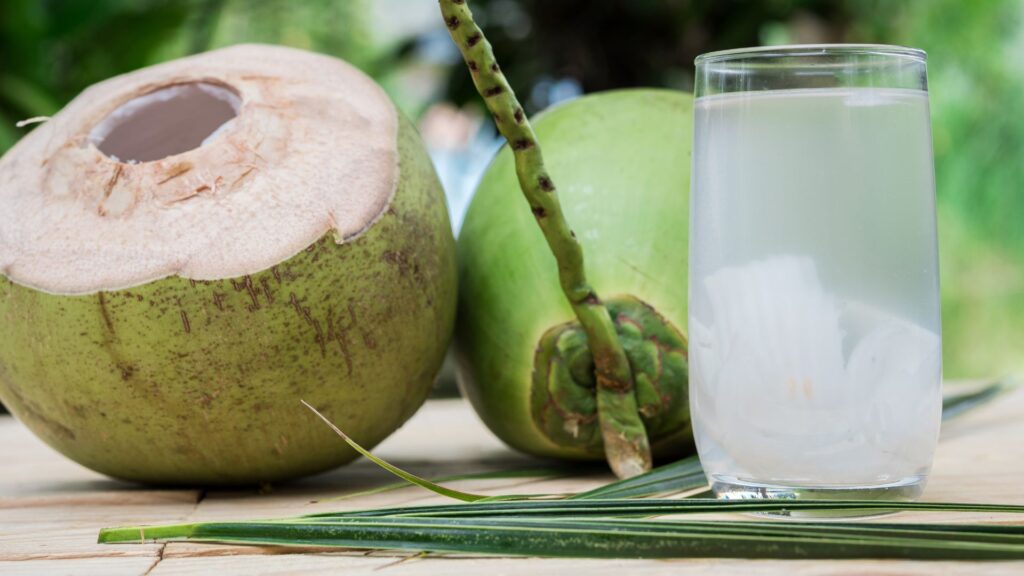
Coconut trees, which are native to Southeast Asia and the islands between the Indian and Pacific oceans, are regarded the most naturally prevalent fruit trees on the earth. Coconuts are now grown all over the world and are becoming increasingly popular for their flavor, culinary uses, and numerous possible health advantages. Let’s look into the potential benefits of coconut, specifically ‘Coconut Water’.
1. A Good Source of a Variety of Nutrients
Coconut water is the liquid found in the middle of a young, green coconut. Coconut water is normally extracted from young coconuts that are around 6-7 months old, but it can also be found in older fruit. An average green coconut yields roughly 1/2-1 cup of coconut water. Coconut water is 94% water with very little fat. It should not be confused with coconut milk, which is prepared by combining water with grated coconut mesh.
2. May Have Antioxidant Properties
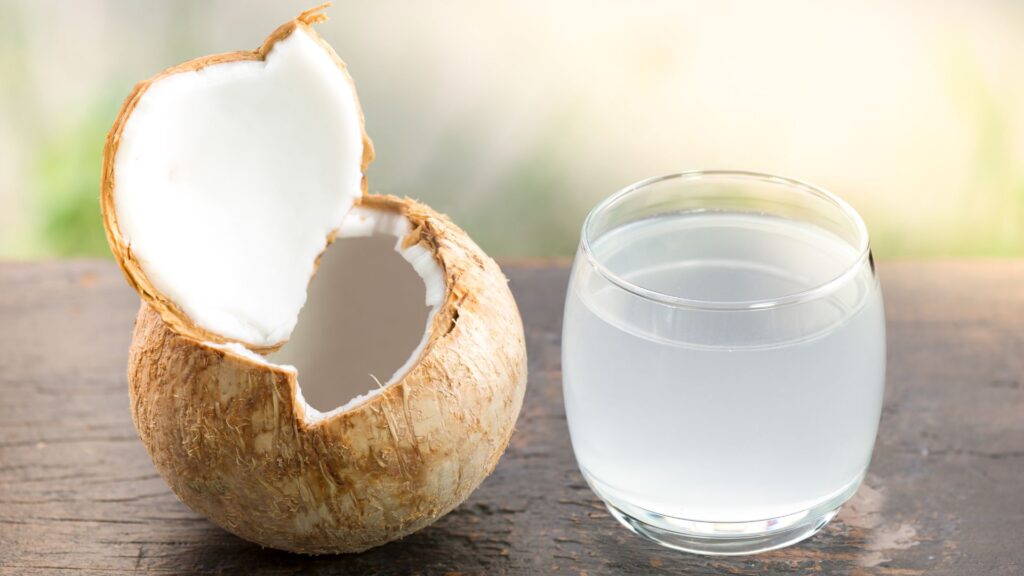
Free radicals are unstable chemicals that your cells make during metabolism. In reaction to stress or damage, their production increases. When there are too many free radicals in your body, you enter an oxidative stress state, which can damage your cells and raise your risk of disease. Animal studies have revealed that coconut water includes antioxidants that may help alter free radicals such that they no longer cause harm.
One 2012 study used coconut water to treat insulin-resistant mice on a high sugar diet. Blood pressure, lipids, and insulin levels all dropped as free radical activity decreased. Another 2014 study discovered that when damaged rat livers were treated with coconut water, they showed considerable improvement in oxidative stress when compared to livers that did not get treatment. A third study, published in 2016, emphasized the effects of coconut water extract on rats on a high-fat diet.
Not only did the coconut water aid lower cholesterol levels, but it also showed “antioxidant potency.” While these findings are intriguing, it’s worth noting that no human studies on the antioxidant potential of coconut water have been conducted yet, and each of the animal research used different dosages and conditions.
3. Lower Blood Sugar for People Living with Diabetes
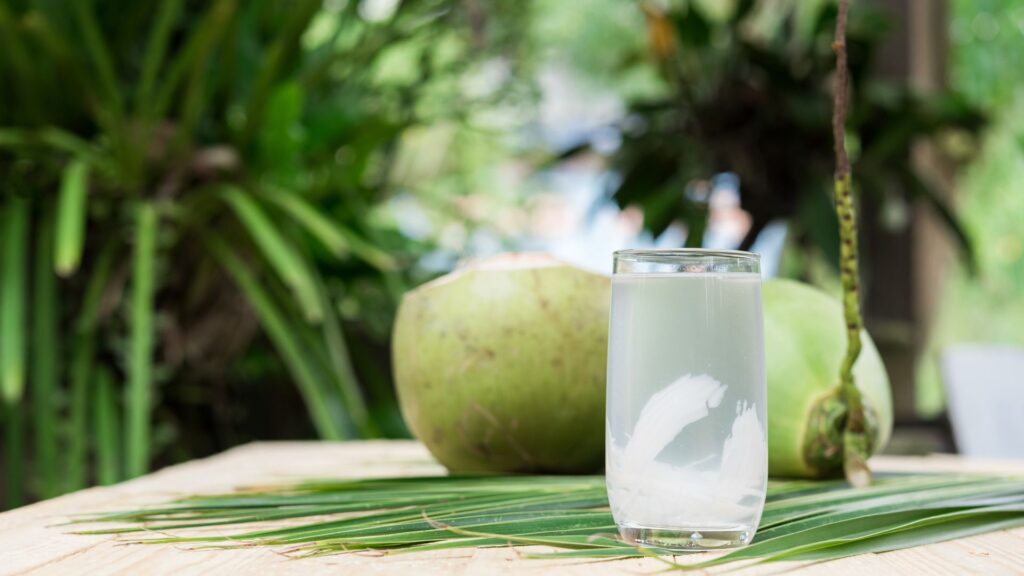
Research indicates that coconut water can reduce blood sugar levels and enhance other health indicators in diabetic animals. In a 2015 study, diabetic rodents treated with coconut water maintained lower blood sugar levels compared to the control group. In the same study, rats given coconut water had reduced hemoglobin A1c levels, indicating improved long-term blood sugar control. A more recent study conducted in 2021 on diabetic rats discovered that coconut water reduced blood glucose levels.
Additional research is required to corroborate these effects in humans. However, coconut water’s magnesium content may increase insulin sensitivity and reduce blood sugar levels in individuals with type 2 diabetes and prediabetes. It is important to note that coconut water contains carbohydrates (which are broken down into glucose in the body), so if you have diabetes or prediabetes, consult your doctor or a dietitian before incorporating it into your diet.
4. May Help Prevent Kidney Stones
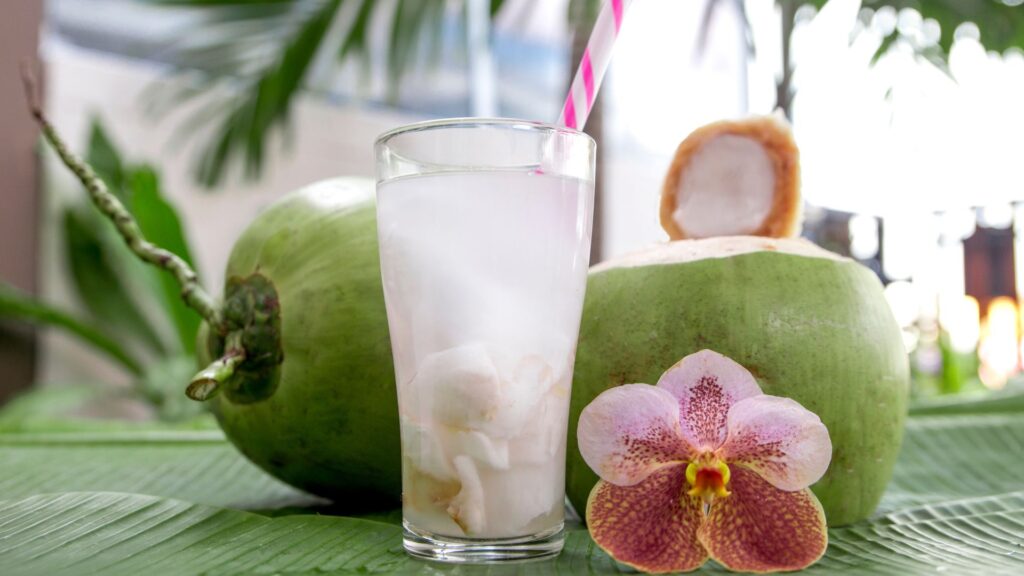
Important for preventing kidney stones is drinking enough fluids. Although plain water is a fine option, two small studies indicate that coconut water may be superior. When calcium, oxalate, and other substances combine to form crystals in the urine, kidney stones are formed. The crystals can then transform into minute stones.
Kidney stones affect approximately 12% of the world’s population, although some individuals are more susceptible than others. In a 2013 study involving rodents with kidney stones, coconut water prevented crystals from adhering to the kidneys and other urinary tract organs.
Additionally, it decreased the quantity of crystals in the urine. In a 2018 study involving eight participants, researchers discovered that coconut water increased the urination of potassium, chloride, and citrate in individuals without kidney stones.
This suggests that coconut water may help cleanse the system and reduce the risk of kidney stones. Due to the fact that one study was conducted on animals and the other is so tiny, much more research is required to determine the efficacy of coconut water in preventing kidney stones.
5. May Support Heart Health
Coconut water may reduce the risk of developing cardiovascular disease. In an older 2008 investigation, researchers fed rats a high-fat and cholesterol diet. In addition, they administered large doses of coconut water to one group (4 ml per 100 grams of body weight). After 45 days, the coconut water group had a reduction in cholesterol and triglyceride levels comparable to the effects of a statin medication used to lower cholesterol. Remember that this was a very potent quantity.
In human terms, it would be equivalent to a 150-pound (68-kg) individual drinking 91 ounces (2.7 liters) of coconut water per day. A study from 2005 suggests that coconut water may also be beneficial for regulating blood pressure in people with high blood pressure, but more research is needed in this area. 8 ounces of coconut water contains an impressive 500 milligrams of potassium, which is one of the reasons it may be linked to lower blood pressure. Potassium has been shown to reduce blood pressure in both individuals with high and normal blood pressure.
6. Beneficial After Strenuous Exercise

Coconut water could be the optimal beverage for restoring hydration and replacing electrolytes depleted during exercise. Electrolytes are minerals that perform a number of crucial roles in the body, including maintaining a healthy fluid balance. A few vital electrolytes include potassium, magnesium, sodium, and calcium. Due to the presence of electrolytes such as potassium and magnesium, coconut water may be superior to water for rehydration after exercise, according to multiple studies. In fact, a small study conducted in Brazil in 2014 discovered that coconut water enhanced exercise capacity more than water or a sports drink on a very hot day.
7. Delicious Source of Hydration
Natural coconut water has a mildly sweet and earthy flavor. It is also minimal in calories and carbohydrates. If you are unable to stock your refrigerator with fresh coconuts, you can find a variety of coconut water brands on store shelves. Just make sure to check the list of constituents to ensure you’re receiving pure coconut water. Some bottled beverages may include added sugar or flavorings. This tropical liquid can be used as a base for smoothies, chia seed pudding, vinaigrette dressing, or as a substitute for plain water whenever a touch of natural sweetness is desired.
Coconut water is a tasty electrolyte-rich natural drink that can help you feel refreshed and hydrated after an exercise and may also be good for your heart, blood sugar, and kidneys. There should be a variety of brands of this tropical beverage available at your local supermarket; just make sure to steer clear of anything with extra sugar.